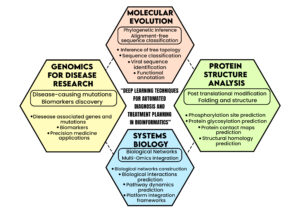In the rapidly evolving field of bioinformatics, the integration of deep learning techniques has emerged as a powerful tool for automated diagnosis and treatment planning. The generation of massive biological data and the complexity of interpreting it has been the biggest challenge. Harnessing the potential of deep learning has become essential to enhance medical decision-making processes. Using deep learning algorithms will provide valuable insights and can be vital in unlocking huge datasets enabling more accurate and efficient diagnosis of various diseases and the creating of personalized treatment plans. Since deep learning models possess the capability to analyze complex biological patterns, identify subtle correlations, and make predictions based on learned features. This facilitates earlier and more precise identification of diseases, contributing to timely interventions and improved patient outcomes. However, despite these advancements, several challenges persist in this research domain. Availability and quality of labeled data, ensuring the generalize ability of deep learning models across diverse datasets and populations and the interpretability of deep learning models remains a concern in this area. To overcome these challenges, researchers are exploring various techniques and strategies. Transfer learning is one such approach that allows models trained on one dataset to be fine-tuned on smaller labeled datasets reducing the need for extensive annotations. On the other hand, data augmentation techniques such as artificially generating data through image rotation or flipping can also enhance the robustness of the training data.
The aim of this Special Issue is to explore and showcase the latest advancements in automated diagnosis and treatment planning using deep learning techniques and models. In this special issue, we hope to foster interdisciplinary collaborations and promote the development of innovative solutions to the challenges faced in this field by bringing together researchers from diverse backgrounds including computer science, bioinformatics and clinical domains. We also encourage submissions that present novel approaches, experimental validations, and practical applications in deep learning for bioinformatics, with an emphasis on addressing data scarcity, interpretability, and generalizability.
List of topics include, but are not limited to:
- Transfer learning strategies for deep learning models in bioinformatics.
- Data augmentation techniques to overcome limited labeled data in bioinformatics.
- Explainable deep learning models for improved interpretability in bioinformatics.
- Deep learning approaches for cancer diagnosis and prognosis prediction.
- Drug discovery and repurposing using deep learning in bioinformatics.
- Personalized medicine and treatment response prediction with deep learning models.
- Deep learning methods for medical imaging analysis in bioinformatics.
- Integration of multi-omics data using deep learning for disease characterization.
- Deep learning-based biomarker discovery and validation.
- Time-series analysis using recurrent neural networks for disease progression modeling.
- Deep reinforcement learning for optimizing treatment planning in bioinformatics.
- Federated learning approaches for collaborative analysis of distributed bioinformatics data.
- Adversarial attacks and defenses in deep learning-based bioinformatics systems.
- Ethical considerations and challenges in deploying deep learning models in clinical settings.
Guest Editors
- Dr. Shakir Khan, College of Computer and Information Sciences,Imam Mohammad Ibn Saud Islamic University (IMSIU), Riyadh, Saudi Arabia, drshakirkhan78@gmail.com, sgkhan@imamu.edu.sa
- Dr. Manju Khari, Jawaharlal Nehru University, Delhi-67, India, manjukhari@jnu.ac.in
- Dr.Mourade Azrour, Moulay Ismail University of Meknes, Errachidia, Morocco, mo.azrour@umi.ac.ma
- Dr. Mohamed Elhoseny,University of Sharjah, UAE, melhoseny@ieee.org, melhoseny@sharjah.ac.ae
Key Dates
- Deadline for Submission: May 05, 2024
- First Reviews Due: July 15, 2024
- Revised Manuscript Due: September 30, 2024
- Final Decision: November 05, 2024

